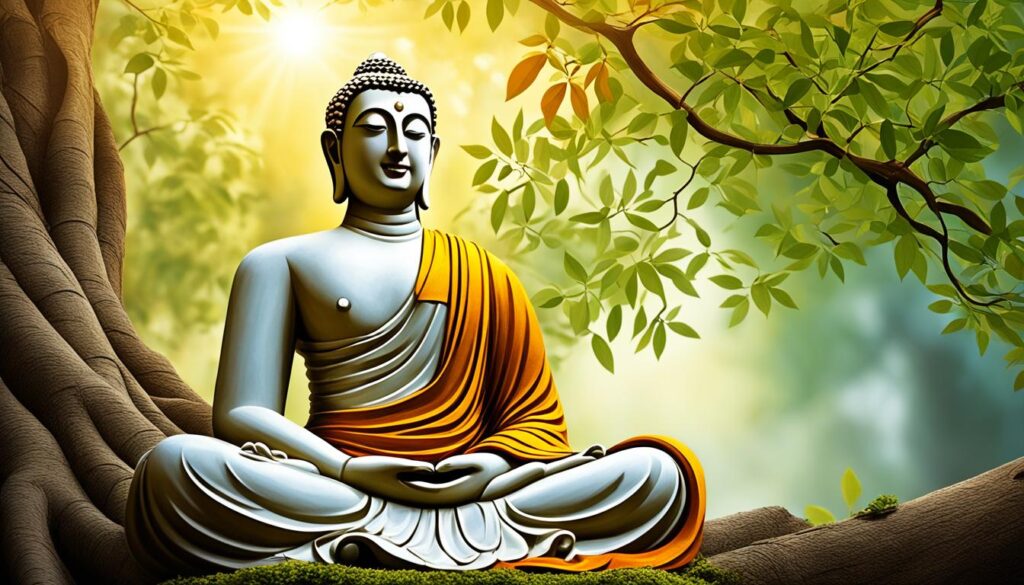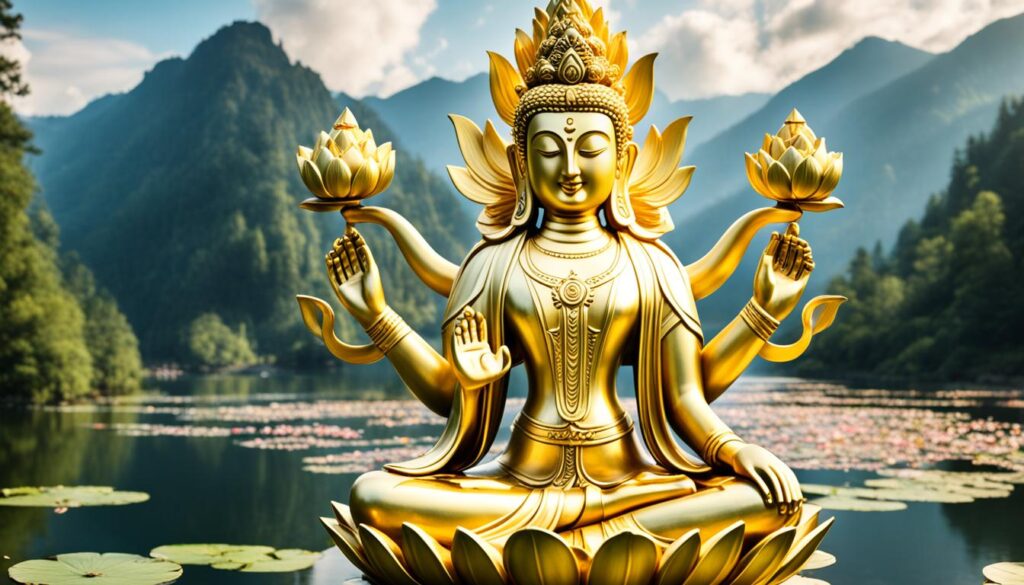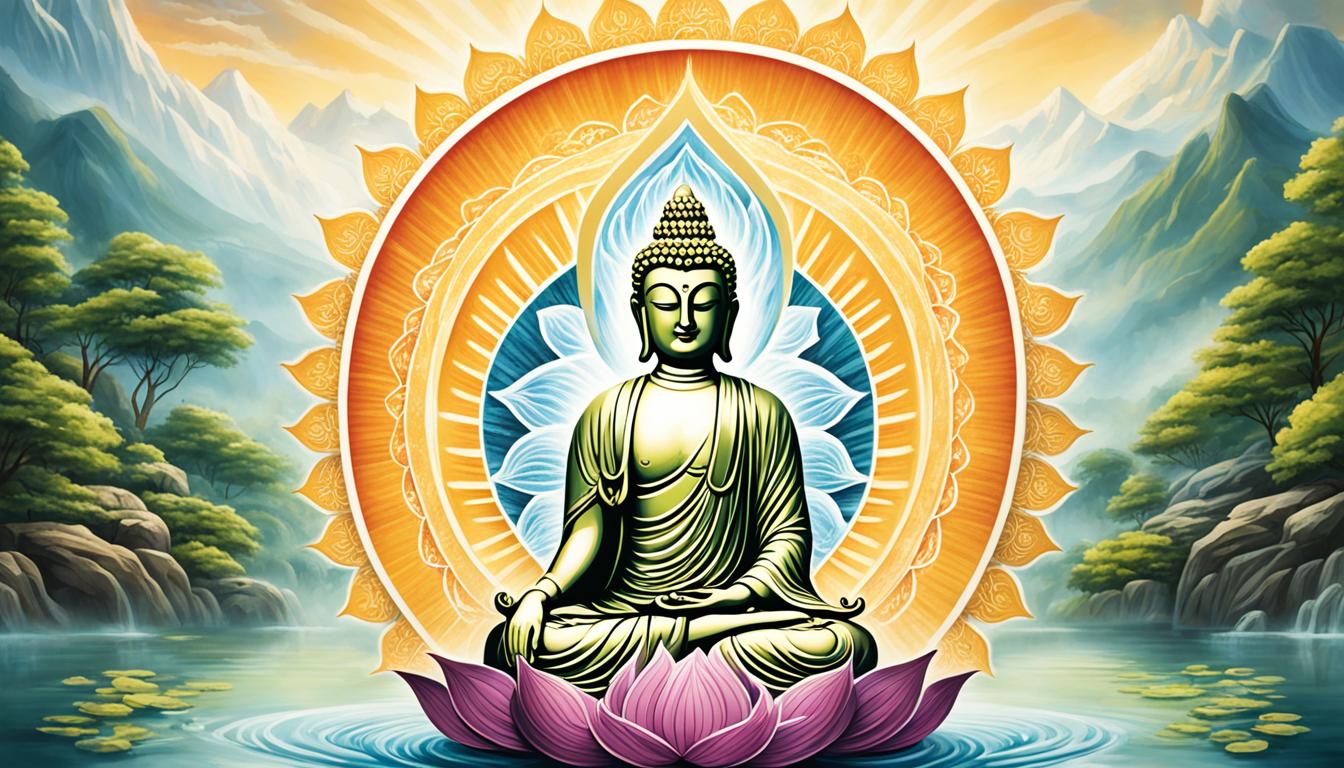“Do not believe in anything simply because you have heard it. Do not believe in anything simply because it is spoken and rumored by many. Do not believe in anything simply because it is found written in your religious books. Do not believe in anything merely on the authority of your teachers and elders. Do not believe in traditions because they have been handed down for many generations. But after observation and analysis, when you find that anything agrees with reason and is conducive to the good and benefit of one and all, then accept it and live up to it.” – Buddha
When it comes to the concept of God, Buddhism takes a unique perspective that differs from many other religious traditions. While major religions often revolve around a deity or a higher power, Buddhists focus on personal transformation and the pursuit of enlightenment. Buddhism originated in South Asia in the 5th century B.C.E. with Siddhartha Gautama, who became known as the Buddha.
Buddhists do not believe in any kind of deity or god, but they do acknowledge the existence of supernatural figures that can help or hinder individuals on their path towards enlightenment. These divine beings, known as bodhisattvas, have achieved enlightenment but choose to remain in the cycle of rebirth to help other beings. While some may argue that this perspective contradicts the idea of a god, Buddhism highlights the importance of personal experience, observation, and reasoning when it comes to beliefs.
Key Takeaways:
- Buddhism does not believe in a supreme being or creator god.
- Buddhists recognize the existence of supernatural figures called bodhisattvas.
- Bodhisattvas have attained enlightenment but choose to remain in the cycle of rebirth to help others.
- Buddhism emphasizes personal observation, analysis, and reasoning in forming beliefs.
- The focus of Buddhism is on personal transformation and the pursuit of enlightenment.
Understanding Siddhartha Gautama – The Buddha
Learn about the fascinating life of Siddhartha Gautama, the historical figure who became known as the Buddha. Siddhartha Gautama was born in present-day Nepal and achieved enlightenment, earning the title of Buddha. His teachings and spiritual insights gave rise to the profound philosophy of Buddhism, which has captivated millions around the globe.
In his quest for deeper understanding, Siddhartha Gautama renounced his royal privileges and embarked on a spiritual journey. Through meditation and contemplation, he attained enlightenment and became the enlightened one – the Buddha. This pivotal event in his life forever changed the course of history and laid the foundation for Buddhism.

The Buddha’s path to enlightenment began with profound self-discipline and self-reflection. He pursued an ascetic lifestyle, seeking answers to the fundamental questions of human existence. After years of rigorous spiritual practice, he realized that extreme self-denial did not lead to true enlightenment. Inspired by this revelation, he embraced the Middle Way, a philosophy that encourages a balanced approach to life, avoiding both indulgence and deprivation.
It was under the shade of the Bodhi tree that the Buddha attained supreme enlightenment. Sitting in deep meditation, he gained profound insights into the nature of suffering and the path to liberation from it. This moment marked the birth of Buddhism and the understanding of the Four Noble Truths, a cornerstone of Buddhist philosophy.
The Four Noble Truths
- The truth of suffering: Life is inherently marked by dissatisfaction, pain, and impermanence.
- The truth of the origin of suffering: Our desires and attachments are the root causes of suffering.
- The truth of the cessation of suffering: By eliminating desires and attachments, we can attain liberation from suffering.
- The truth of the path to the cessation of suffering: This path, known as the Noble Eightfold Path, provides guidance for cultivating wisdom, ethical conduct, and mental discipline.
As the Buddha shared his teachings, Buddhism rapidly spread throughout Asia and eventually reached the rest of the world. His profound insights into the nature of suffering and the human condition continue to resonate with people of all backgrounds, inspiring them to seek enlightenment and inner peace.
The Concept of Deities in Buddhism
While Buddhists do not believe in a supreme being or creator god, they do recognize the existence of supernatural figures in their cosmology. These figures, known as bodhisattvas, have achieved enlightenment but choose to remain in the cycle of rebirth to help other beings.
Buddhists may engage in rituals and practices that involve these divine beings, seeking their guidance and assistance on their spiritual journey. Despite their recognition of these supernatural figures, Buddhists understand that these deities are not the ultimate goal of their practice.

Instead, the ultimate goal of Buddhism is to attain enlightenment and escape the cycle of rebirth. The concept of deities in Buddhism serves as a means for practitioners to connect with higher realms and seek spiritual guidance along their path to liberation.
Different Buddhist Perspectives on God
In Buddhism, the concept of God varies across different schools of thought. While Buddhism as a whole does not believe in a higher power or god, individual perspectives may differ within the broader framework of Buddhist teachings on suffering and enlightenment.
In Mahayana Buddhism, bodhisattvas hold a significant role and are revered as embodiments of compassion and wisdom. They are seen as enlightened beings who choose to remain in the cycle of rebirth to assist others in their spiritual journey. Bodhisattvas serve as guiding figures and sources of inspiration for practitioners seeking enlightenment.
Theravada Buddhism, on the other hand, focuses more on personal liberation and the pursuit of enlightenment through meditation and ethical living. The emphasis is on individual effort to attain enlightenment and break free from the cycle of suffering. While there may not be a belief in a specific god, the focus is on self-realization and the cultivation of wisdom and compassion.
In Vajrayana Buddhism, particularly in Tibetan Buddhism, the worship of deities plays a role in the path to enlightenment. Deities are seen as skillful means or expedient methods to help practitioners achieve enlightenment more rapidly. They are not worshipped as gods in the traditional sense, but rather as symbols of the qualities and attributes that one aspires to cultivate on their spiritual journey.
Different Buddhist perspectives on god reflect the diversity of approaches within the broader teachings of Buddhism. Whether it is through the reverence of bodhisattvas, the focus on personal liberation, or the incorporation of deity worship, each perspective offers unique insights and practices that guide practitioners towards the ultimate goal of enlightenment.

| Buddhist Perspective | Belief in God | Focus |
|---|---|---|
| Mahayana Buddhism | No belief in a God | Reverence towards bodhisattvas as embodiments of compassion and wisdom |
| Theravada Buddhism | No belief in a God | Focus on personal liberation and individual effort to attain enlightenment |
| Vajrayana Buddhism | No belief in a God | Incorporation of deity worship as a means to expedite the path to enlightenment |
The Role of Karma and Rebirth in Buddhism
Buddhism teaches a profound belief in karma, which is the fundamental notion that a person’s actions in their past lives or the past affects their future experiences. The concept of karma is based on the understanding that every action has consequences, leading to either positive or negative outcomes.
Positive actions generate good karma, leading to favorable experiences and circumstances, while negative actions accumulate bad karma, resulting in suffering and adversity. This understanding of karma emphasizes personal responsibility and the interconnectedness of actions and their effects.
In Buddhism, karma is closely intertwined with the cycle of rebirth. Rebirth, also known as reincarnation, is the idea that individuals are continuously reborn into new bodies based on the karma they have accumulated in previous lives. Every action, thought, and intention influences one’s future existence.
The goal within Buddhism is to break free from the cycle of rebirth and attain enlightenment, which liberates one from the cycle of suffering. By understanding the law of karma and its impact on rebirth, Buddhists strive to cultivate positive actions, thoughts, and intentions to generate good karma and progress towards liberation.
Understanding Karma’s Impact
The belief in karma provides a moral compass for Buddhists, guiding their actions and encouraging them to act with compassion, kindness, and mindfulness. It fosters an awareness of the consequences of their behavior and intentions, encouraging them to make choices that benefit themselves and others.
By recognizing the role of karma in their lives, individuals are empowered to actively shape their own destinies. They understand that their present actions create the causes and conditions for their future experiences, offering an opportunity for growth, transformation, and spiritual development.
The understanding of karma extends beyond individual actions and encompasses the collective actions of society as a whole. Buddhists believe that the karma of a community or society influences the experiences and conditions that its members collectively encounter.
By cultivating positive karma, individuals can contribute to creating a collective environment that promotes harmony, well-being, and spiritual growth. This understanding has profound implications for personal relationships, social interactions, and the ethical conduct of individuals within a community.
Ultimately, the belief in karma and rebirth emphasizes the impermanence of existence and the interconnected nature of all beings. It offers a framework for understanding the consequences of our actions and provides motivation to cultivate wisdom, compassion, and ethical behavior in order to progress along the path towards enlightenment.

By striving to generate positive karma and break free from the cycle of rebirth, individuals can attain nirvana, the ultimate state of liberation and transcendence. In this state, one becomes free from suffering, attachments, and the limitations of individual existence.
Through the understanding and application of karma, Buddhists seek to transform themselves and contribute to the transformation of the world around them. The belief in karma serves as a powerful reminder of the interconnectedness of all life and the transformative potential within each individual.
The Three Main Schools of Buddhism
Buddhism encompasses three main schools: Mahayana, Theravada, and Vajrayana. Each school offers unique perspectives and practices, guiding individuals on their spiritual path to enlightenment.
Mahayana Buddhism
Mahayana Buddhism is prevalent in East Asia and emphasizes compassion and the pursuit of enlightenment for the benefit of all beings. In this school, bodhisattvas are revered as role models and spiritual guides. Bodhisattvas have achieved enlightenment but choose to remain in the cycle of rebirth to assist others in their journey towards liberation.
Theravada Buddhism
Theravada Buddhism, prominent in Southeast Asia, focuses on monasticism and meditation as the primary path to enlightenment. This school places great importance on personal liberation and the cultivation of wisdom through dedicated practice and ethical living. Theravada Buddhists strive for individual awakening and aim to attain enlightenment as the ultimate goal.
Vajrayana Buddhism
Vajrayana Buddhism, mainly practiced in Tibet, incorporates tantric practices and rituals to expedite the journey to enlightenment. This school introduces a diverse array of techniques to accelerate spiritual progress, including mantras, visualizations, and complex rituals. Vajrayana Buddhism emphasizes the importance of a qualified guru in guiding practitioners towards awakening.
Each school of Buddhism provides distinct approaches and practices for spiritual development, allowing individuals to find a path that resonates with their unique journey toward enlightenment.
Conclusion
Discover the profound spirituality of Buddhism, where wisdom and compassion guide your path towards transformation. Unlike other religions, Buddhism doesn’t rely on belief in a god or deity. Instead, it encourages understanding and embracing the interconnectedness of all beings.
By practicing moral behavior, meditation, and the pursuit of wisdom, Buddhism empowers you to navigate life’s challenges with clarity. The Noble Path, a transformative journey, unveils the potential for liberation from suffering. Through this path, you cultivate spiritual growth and find harmony within yourself and the world.
Immerse yourself in the teachings of Buddhism to harness the power of spirituality. Embrace the wisdom that enables you to see beyond personal limitations, foster compassion for all beings, and walk the noble path of self-discovery. Buddhism offers timeless insights that resonate deeply, offering solace, guidance, and a path to transformation in the modern world.
FAQ
Does Buddhism believe in God?
No, Buddhism does not believe in a supreme being or creator god. However, Buddhism acknowledges the existence of supernatural figures that can aid individuals on their spiritual journey.
What is the concept of deities in Buddhism?
While Buddhists do not believe in a god, they recognize the presence of bodhisattvas, divine beings who have achieved enlightenment but choose to remain in the cycle of rebirth to assist others.
What are the different perspectives on God in Buddhism?
Buddhism as a whole does not have a specific belief in a higher power or god. However, varied schools of Buddhism may have different perspectives on the concept of god, such as the reverence of bodhisattvas in Mahayana Buddhism.
What is the role of Karma and rebirth in Buddhism?
Karma is a fundamental belief in Buddhism, where a person’s actions generate good or bad karma, leading to corresponding outcomes in future lives. Rebirth occurs as individuals continuously reincarnate into new bodies based on their karma.
What are the Three Main Schools of Buddhism?
The three main schools of Buddhism are Mahayana, Theravada, and Vajrayana. Mahayana emphasizes the pursuit of enlightenment for the benefit of all beings, Theravada focuses on monasticism and meditation, and Vajrayana incorporates tantric practices and rituals.
What is the goal of Buddhism?
The goal of Buddhism is to end suffering and cultivate wisdom and compassion. Buddhism offers valuable insights for personal and societal harmony through moral behavior, meditation, and the pursuit of enlightenment along the Noble Path.

